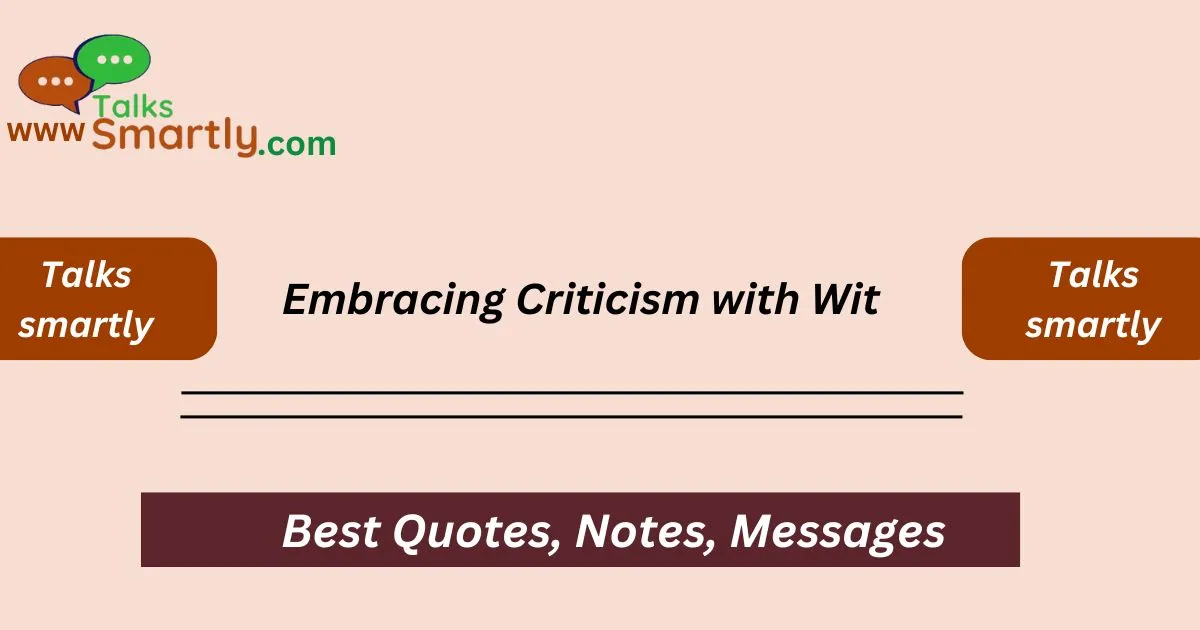“Master the art of witty comebacks to turn criticism into laughter and confidence!”
Criticism is a part of life, but how we respond can make all the difference. Instead of feeling defeated, embracing criticism with wit can not only diffuse tension but also showcase your confidence. A clever comeback can transform a potentially uncomfortable situation into an opportunity for humor and self-assurance.
If you often find yourself at a loss for words when faced with criticism, this post is for you! We’ll explore how to turn those biting comments into a moment of laughter. By using these clever responses, you can create a lighthearted atmosphere that makes you and those around you feel better.
In this blog post, we’ll share 35 witty comebacks to help you embrace criticism with style. Whether you want to disarm a critic or simply want a good laugh, these responses will give you the tools to navigate any critique with flair.
35 Embracing Criticism with Wit
- “I see your point—my point is better.”
- “Thank you for your input; I’ll file it under ‘I don’t care.’”
- “Constructive criticism? I thought you were just constructing!”
- “Is that your final answer?”
- “Wow, I didn’t realize you were an expert!”
- “Did you get that from the ‘How to Critique’ handbook?”
- “Thanks! I’ll add it to my list of things to ignore.”
- “That’s a unique perspective—one I don’t plan to adopt.”
- “If I had a dollar for every time I heard that, I’d be rich!”
- “I didn’t realize you were my life coach.”
- “I’ll consider your thoughts—right after my nap.”
- “I’m sorry you feel that way; my therapist said that’s a you problem.”
- “Your criticism is like a pop quiz—I didn’t study!”
- “That’s a bold statement coming from someone who…”
- “Thanks for your feedback; let’s see how it plays out!”
- “Are you trying to help me or just auditioning for a role?”
- “Thanks! I needed a good laugh today!”
- “Wow, your opinion really matters… to you!”
- “Did you practice that line in front of the mirror?”
- “Thank you for that insightful comment! Next!”
- “I didn’t realize we were in a critique competition!”
- “Interesting! I didn’t know you were a comedian.”
- “I’ll remember this when I’m making my next big decision!”
- “Thanks for sharing your wisdom! I’ll cherish it forever.”
- “I didn’t know I was signing up for your TED Talk!”
- “That’s a strong opinion! I admire your dedication.”
- “Criticism is free, but I prefer compliments.”
- “I’ll take that under advisement, along with my breakfast.”
- “Your feedback is as welcome as a rainstorm in a desert.”
- “Did you think that would hurt my feelings? Cute!”
- “Thanks for your thoughts! I’ll keep them in mind—right next to my grocery list.”
- “I appreciate your feedback; let’s see how it plays out!”
- “Thanks for your input! I’ll be sure to reference it the next time I need a laugh!”
- “Wow, that was a real knee-slapper! Should I expect a stand-up routine next?”
- “I’ll add that to my grocery list of things I won’t remember!”
1. “I see your point—my point is better.”
A playful way to acknowledge feedback while asserting your own opinion.
Example: “I appreciate your feedback, but my point has its own charm!”
2. “Thank you for your input; I’ll file it under ‘I don’t care.’”
This light-hearted response makes it clear you’re not taking the criticism to heart.
Example: “Thanks for sharing! I’ll be sure to reference it the next time I need a laugh!”
3. “Constructive criticism? I thought you were just constructing!”
A fun way to poke fun at the critic’s delivery.
Example: “I love how you’re so passionate about building something—too bad it’s just criticism!”
4. “Is that your final answer?”
A playful nod to game shows that adds a humorous twist.
Example: “You really think that’s the best you’ve got? I’m ready for the next round!”
5. “Wow, I didn’t realize you were an expert!”

This sarcastic response acknowledges the critic’s self-proclaimed expertise.
Example: “You’ve got all the answers! Are you starting a consultancy next?”
6. “Did you get that from the ‘How to Critique’ handbook?”
A witty way to question the critic’s authority Criticism with wit.
Example: “I’d love to see that handbook—sounds like a bestseller!”
7. “Thanks! I’ll add it to my list of things to ignore.”
This response shows that you’re unfazed by the criticism.
Example: “I appreciate the feedback! It’s going right on my ignore list, right above my ex’s texts!”
8. “That’s a unique perspective—one I don’t plan to adopt.”
This acknowledges the criticism while firmly standing your ground.
Example: “Your view is interesting, but I think I’ll stick to my own vision!”
9. “If I had a dollar for every time I heard that, I’d be rich!”
A humorous way to downplay the criticism.
Example: “Thanks for the tip! I’ll be sure to add that to my collection of unsolicited advice!”
10. “I didn’t realize you were my life coach.”
This line turns the tables, adding a touch of sarcasm Criticism with wit.
Example: “Thanks for the coaching session! I didn’t sign up, but I appreciate it!”
11. “I’ll consider your thoughts—right after my nap.”
A humorous way to indicate that you’re not taking the criticism seriously.
Example: “I’ll definitely think about what you said—once I wake up from my nap!”
12. “I’m sorry you feel that way; my therapist said that’s a you problem.”
This response playfully shifts the blame back to the critic.
Example: “I understand you have strong feelings; my therapist says it’s perfectly fine!”
13. “Your criticism is like a pop quiz—I didn’t study!”
A light-hearted way to indicate you’re unprepared for their feedback Criticism with wit.
Example: “Oh no, I wasn’t ready for this pop quiz! Can I get a lifeline?”
14. “That’s a bold statement coming from someone who…”
This sets up for a humorous comparison.
Example: “That’s quite a bold statement coming from someone who can’t even cook toast!”
15. “Thanks for your thoughts; I’ll add them to my ‘no thanks’ list.”
This straightforward response makes your position clear.
Example: “I appreciate the feedback, but it’s going right on my ‘no thanks’ list!”
16. “I’ll take that under advisement, along with my breakfast.”
A cheeky way to show you have more important things to think about.
Example: “Your input is noted, but right now, pancakes are my priority!”
17. “Wow, your opinion really matters… to you!”
This response playfully highlights the critic’s self-importance.
Example: “I love how passionate you are about your opinion—keep it up!”
18. “Did you practice that line in front of the mirror?”
This response suggests that their critique may be rehearsed Criticism with wit.
Example: “That was smooth! Did you rehearse that line in front of the mirror last night?”
19. “Thank you for that insightful comment! Next!”
A quick and witty way to move on from the criticism.
Example: “Your insight is so precious! Can I get a next contestant, please?”
20. “Criticism accepted; I’ll add it to my ‘things to laugh about’ list.”
This indicates that you’re not taking it to heart.
Example: “I’ll add that gem to my list of things to giggle over later!”
How to Respond to a Date Cancellation
21. “I didn’t realize we were in a critique competition!”
This humorous response lightens the mood.
Example: “Oh, I thought we were just chatting—should I prepare my rebuttal?”
22. “That’s one way to look at it! I prefer my version.”
Acknowledging their view while standing firm in your own Criticism with wit.
Example: “That’s an interesting perspective; mine involves less negativity!”
23. “I appreciate your feedback; let’s see how it plays out!”
This shows you’re open to criticism without being overly serious.
Example: “Thanks for the input! Let’s see how it unfolds; I’m excited!”
24. “Are you trying to help me or just auditioning for a role?”
A playful jab at their intentions.
Example: “Is this an intervention, or are you just practicing for a role in a drama?”
25. “Thanks! I needed a good laugh today!”

This response flips the criticism into something positive.
Example: “Your comment really brightened my day—thank you for the laugh!”
26. “Wow, you really care! What a surprise!”
A sarcastic acknowledgment of their input.
Example: “It’s heartwarming to see how much you care about my life choices!”
27. “Your feedback is as welcome as a rainstorm in a desert.”
Indicating their criticism isn’t needed.
Example: “Your feedback is just as refreshing as a rainstorm in a drought—no thanks!”
28. “Did you think that would hurt my feelings? Cute!”
Playfully dismissing the impact of their words.
Example: “Oh, you thought that would sting? Adorable! Let’s move on!”
29. “Thanks for your thoughts! I’ll keep them in mind—right next to my grocery list.”
Indicating their input won’t be prioritized.
Example: “I’ll add that to my grocery list of things I won’t remember!”
30. “Interesting! I didn’t know you were a comedian.”
Highlighting the absurdity of their criticism.
Example: “Wow, that was a real knee-slapper! Should I expect a stand-up routine next?”
31. “I’ll remember this when I’m making my next big decision!”
A sarcastic way to indicate their input is irrelevant.
Example: “Your input is noted for when I decide on my next vacation destination!”
32. “Thanks for sharing your wisdom! I’ll cherish it forever.”
A mockingly formal way to downplay their comment.
Example: “I’ll frame your advice and hang it on my wall—what an honor!”
33. “I didn’t know I was signing up for your TED Talk!”
Playfully suggesting their critique was a bit much Criticism with wit.
Example: “Wow, was that a TED Talk? Because it felt like a masterclass in criticism!”
34. “That’s a strong opinion! I admire your dedication.”
Acknowledge their passion while keeping it light.
Example: “I appreciate how much energy you put into that opinion; it’s impressive!”
35. “Criticism is free, but I prefer compliments.”
A humorous way to steer the conversation in a more positive direction.
Example: “Thanks for the feedback, but I’d really love to hear some compliments instead!”
ANSWER TO KEY QUESTION
1.Why use witty comebacks?
They can defuse tension and turn negative situations into light-hearted ones.
2.When is it appropriate to use these responses?
Use them in casual settings where humor is welcomed, not in serious discussions.
3.How can I come up with my own witty comebacks?
Think about the context, use wordplay, and don’t be afraid to be a little sarcastic!
4.What if I don’t feel comfortable making jokes?
It’s okay! You can always respond more calmly or assertively if humor isn’t your style.
5.Will these responses work for everyone?
Not everyone appreciates humor in criticism, so gauge your audience first.
Conclusion
Embracing criticism with wit is a powerful way to handle negativity. These 35 clever comebacks allow you to turn a potentially awkward situation into a moment of levity. With humor on your side, you can navigate criticism confidently, leaving room for laughter and connection. So the next time someone critiques you, remember: a little wit can go a long way!












